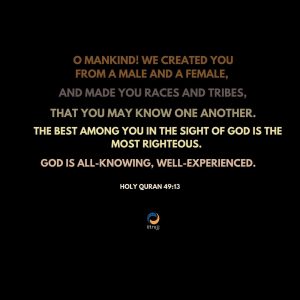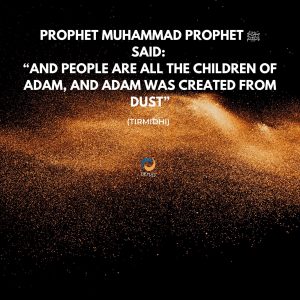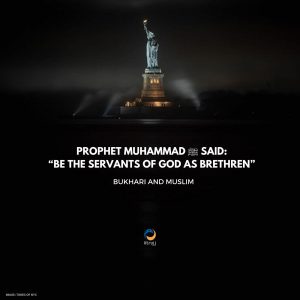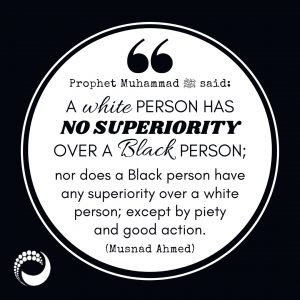The death of George Floyd matters
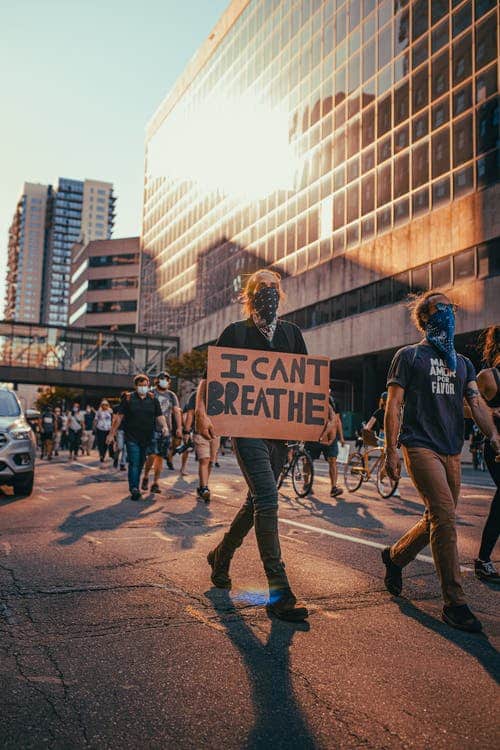
In the opening verses of Surat al Qasas, Allah Almighty says:
We recite to you from the story of Moses and Pharaoh—in truth—for people who believe.
Pharaoh exalted himself in the land,and divided its people into factions. He persecuted a group of them, slaughtering their sons, while sparing their daughters. He was one of the mischief makers. (28:2-4)
Fir’aun is the symbol of arrogance
Allah Almighty mentions Fir’aun in about 70 verses of the Quran, in 28 different surahs. He is the symbol of oppression and corruption, a despicable tyrant and the embodiment of evil. Allah therefore uses him to warn believers not to fall into the trap of getting too big for their boots.
Allah Almighty here describes Fir’aun’s corruption. He was exalted in the land, not one of the ordinary people, not just a cut above, but a superior being, the son of the sun. In their tradition the sun was a god, so in effect he set himself up as being divine. And he claimed at one point that he is a Lord:
He said: I am your Lord the most high. (79:24).
Accordingly he started looking down at others, despising them and oppressing them. This is kibr (arrogance).
The first sin was kibr
The first very first manifestation of arrogance is in the story of Iblees when he claimed he was better than Adam, and refused to bow down to him as commanded:
‘I am better than him (Adam), You created me from fire, and him You created from clay.’ (7:12)
This was his sin. Kibr.
Superiority manifests itself in evil ways
Fir’aun was following shaytan’s footsteps. He considered himself better than others. Similarly we see the story of George Floyd which is in the headlines every day. A group of people feel there are better than another, that they have the right to persecute them, to kill them, hit them, imprison them disrespect them and step on them, humiliate them and insult them. Why? Because they can get away with it. It is systemic oppression.
Divide and rule
Fir’aun and his supporters were spreading corruption everywhere. Their story is not told for entertainment, it is to warn us. The way Fir’aun controlled his people was by dividing them and planting discord among them, so he could pull the strings, and keep them busy fighting among themselves, so they would not rise up against him.
We see this pattern among all oppressors and tyrants throughout history and throughout the world. Divide and conquer. In history they estimated Fir’aun divided his people in 36 sections. So he persecuted a group of them, not all of them. Similarly we see the African Americans, or Muslims or Arabs and other groups persecuted in different places not because of any valid reason, but because of the colour of their skin or they way they dress or because of the way they look: their beard or niqab.
We are all equals in humanity
Allah Almighty refutes the superiority of any one people over another. He says:
O mankind, indeed We have created you from male and female and made you peoples and tribes that you may know one another. Indeed, the most noble of you in the sight of Allah is the most righteous of you. Indeed, Allah is Knowing and Acquainted. (49:13)
In the hadith the Prophet (peace be on him) said in his Last Sermon, all of you are from Adam and Adam has been created from dust. (Tirmidhi)
So we all have the same father, we are all humans, the creation of Allah. Hence the Prophet Muhammad said:
A white person has no superiority over a black person; nor does a black person have any superiority over a white person; except by piety and good action. (Musnad Ahmed)
We cannot stay silent when there is oppression
The riots are an expression of frustration. Leave aside those who are destroying and looting, this is not allowed, but expressing your dissatisfaction peacefully is allowed. The Prophet (peace be on him) taught his companions to leave the days of such ignorance behind.
When a companion demonstrated arrogance, because the colour of another companions mother, the Prophet (peace be on him) was sad and said:
‘You are a person who has some traces of Jahiliyyah (ignorance) in you’. (Bukhari and Muslim).
No one has the right to take your dignity from you. Or your freedom. Or act superior towards you. We are all equal.
Pride comes before a fall
Anas bin Malik (may Allah be pleased with him) reported the Messenger of Allah (ﷺ) had a she-camel called Al-‘Adba’ which would not allow any other camel to surpass her. A bedouin came riding a young camel which outstripped it. The Muslims were much grieved at this. Messenger of Allah (peace be on him) perceived it and said:
It is Allah’s Law that He brings down whatever rises high in the world. (Bukhari)
This is the law Allah created. Anyone who reaches the point where they think they are superior to others will eventually be cut down to size.
Allah Almighty described Fir’aun as ala fil ard, he claimed he was exalted and above the law, and above any human. However, our status is not elevated by wealth or position, we are all equal except in piety.
Show respect and love for all of Allah’s creation
The Prophet (peace be on him) taught us to respect each other and not to oppress one another or look down on one another. Treat people nicely and kindly with love and mercy. Until we do this, hatred breeds hatred. Hatred breeds oppression. Oppression breeds extremism. We can’t continue oppression. Look at the Middle East and the continual oppression over decades. The same thing happens everywhere where there is oppression, you will see the unexpected.
Spread justice and love
The solution for our problems is to spread justice. People want justice and respect and dignity. And they want their rights. All of us whether we are black or white, Muslim or non-Muslim, we are all equal. Allah Almighty is telling us from the story of Fir’aun how not to behave and how to act with justice.
Check your own prejudices
It is easy to point fingers at governments and the police for their racism. Though this is a valid criticism, it should not deter us from looking at our own issues within our own community.
While the very ethos of a Islam is the antithesis of racism it is a sad fact that we still have some Muslims who have racial prejudices.
Racism is rife among the Muslim community as well, and we need to look inwards and interrogate our own biases.
How do we spread justice?
The current moment has highlighted that none of us are doing enough to combat in our daily lives.
It’s not enough to say you are passively ‘not racist’, we have to be actively anti-racist. This first takes the form of educating ourselves about the history of racism and the ways in which it is present today – listen to what Black people have to say.
Spread awareness of this issue on whatever platform you have – even if don’t have a large following, your voice matters. Write to your MP asking them to end state-sanctioned violence against minority groups – this includes things such as housing inequalities, unequal access to education, the Prevent strategy, stop and search policies and many more – and make sure anti-racism is taught in schools.
Click here to write to your MP
Sign petitions asking for all of the above.
We ask Allah to bring justice to our communities and lift this pandemic from us. And to bring tranquillity again to our communities and cities and countries. And cure those who are ill and support those who are hopeless and give us the strength to change our reality and make it better. Ameen.
The Friday Reminder delivered on 6th June 2020.
Recommended Posts

How Allah strengthens the hearts of believers
April 19, 2024

Don’t be a Ramadani person – Be a Rabbani person.
April 10, 2024

